
News
- EU announces climate and energy goals for 2030
The European commission has announced a target to reduce its emissions by 40% by 2030 compared to 1990 levels. It also stated that 27% of total energy production should come from renewable sources. The announcement came on 22 January following intense negotiations between its member states.

The European Commission, Brussels – Source: Sébastien Bertrand, Wikimedia Commons.
The 40% reduction is at the high end of the range of projected decisions, and is the toughest climate change target of any region in the world. The renewable energy target of 27% is an EU-wide binding agreement, meaning that individual states are not obliged to commit to increasing renewables to this level.
The decision to remove country-specific targets places faith in individual states to meet these targets.
The EU targets are the first to be announced ahead of the international meeting that will take place in Paris in 2015, where world governments will discuss a global framework to avoid dangerous levels of emissions and global warming. Every country is expected to announce its own emission and energy targets ahead of the meeting.
The UK energy and climate change secretary Ed Davey opposed the target but was overruled as other big member states such as France, Germany and Italy backed it.
More details and commentaries can be found on Carbon Brief. A step-by-step account of the day can be found on The Guardian website. You can watch the press conference here.
- UK Chief Scientific Adviser talks climate
The UK Government Chief Scientific Adviser Sir Mark Walport will give a series of lectures on climate change at Science and Discovery Centres around the country. The tour will kick-off at the Museum of Science and Industry in Manchester on January 28th. It will continue throughout February and March 2014 with events in Bristol, Belfast, Birmingham, London and Edinburgh.
- US sets greenhouse gas targets for power plants
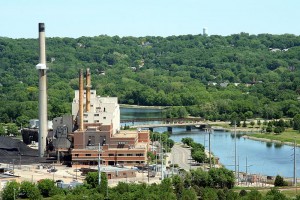
A coal fired power plant in Minnesota. Source – Wikimedia Commons
The US Environmental Protection agency have recently published a rule that governs the limit of the amount of greenhouse-gas emissions that can be released from power plants. The rule effectively means that any new coal-fired power plants built in the US must capture and sequester around 40% of their emissions. This post on the Union of Concerned Scientists‘ website focusses on the science around this new policy initiative.
- The EU goes blue
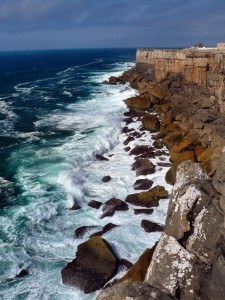
Source: Wikimedia Commons.
The European Commission unveiled an action plan to harvest renewable energy from Europe’s Seas and Oceans, otherwise known as “Blue Energy”. This includes developing technologies to capture energy from waves, tides and temperature differences in the water. It is thought that the resources available in the world’s waters could exceed the world’s present and projected future energy needs. The Commission has set up an Ocean Energy Forum to address the challenges faced by the Blue Energy sector, including high cost of technology and complicated licensing rules.
- Erratic weather over the festive season
There has been much written about the erratic weather and devastating flooding around the UK over the festive period. With particular focus on the impacts of the cuts in the Department of Farming and Rural Affairs and the Environment Agency and whether this would have an impact in the future. Now a new report says that spending plans have a £500 million shortfall over 25 years which could put more than 250,000 homes at risk. See the story on BBC News – Flood funds gap puts ‘250,000’ homes at risk’
- More El Nino in a warming world
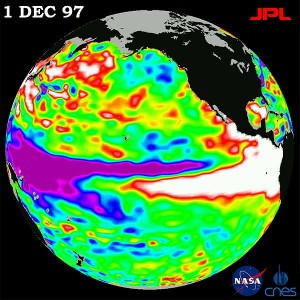
The 1997 El Nino seen by TOPEX/Poseidon. Source – Wikimedia Commons
This week there have been a few stories on the mutual impact of Climate Change and El Nino. This article in Nature discussed how the frequency of extreme El Nino events could double as the world warms while others discussed concern over 2013 being the hottest year on record despite it not being an El Nino year, normally a key driver of hotter years.
- Exploring one of the world’s most mysterious seas
The next big project for the International Ocean Discovery Program (IODP) is to unravel the geological history of the South China Sea. In particular, the project will focus on the formation of the Sea, due to its unique position between the highest point on Earth in Himalayas and the deepest point, the Mariana Trench.
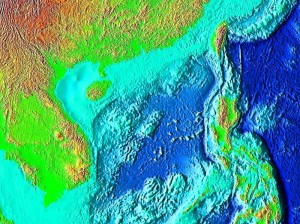
The South China Sea. Source – Wikimedia Commons.
Research highlights
- A distant connection between the North Atlantic Ocean and Antarctic sea ice
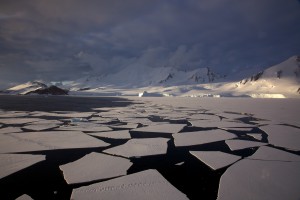
Antarctic mountains and pack ice – Source: Jason Auch, Wikimedia Commons.
Temperature changes in the North Atlantic Ocean could directly influence the amount of sea ice in Antarctica, a new study has shown. This could explain the observed increase in Antarctic sea ice, despite the region experiencing the most pronounced amount of warming.
Researchers from the Courant Institute of Mathematical Science at New York University looked at satellite data, observations of ocean temperature and data from 18 Antarctic research stations. Using this data and a global atmospheric climate model, they found a relationship between decade-long winter temperatures in the North and tropical Atlantic surface waters and the concentration of Antarctic sea ice.
Their results suggest that the Atlantic Ocean could play an important role in influencing Antarctic climate, and should be taken into account when modelling future impacts of climate change.
The results were published in the journal Nature.
- Ancient moss reveals Arctic warming unprecedented in 44,000 years
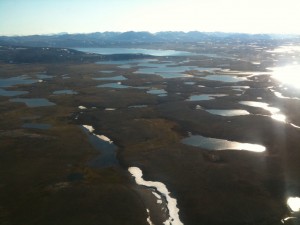
Baffin Island – Source: Wes Gill, Wikimedia Commons.
Present-day temperatures in the Canadian Arctic are warmer than the natural historical variability of the past 44,000, researchers have suggested.
A team led by scientists from the University of Boulder, Colorado, collected and analysed 365 moss samples from 110 locations on Baffin Island in the eastern Canadian Arctic. The mosses were originally buried under ice and have been exposed by the recent warming of this region.
Radiocarbon dating of these biological samples suggested that the region is warmer now than in any century in the past 5000 years, and in some areas warmer than in the past 44,000 years. The authors conclude that human activities have led to unprecedented warmth in the region.
The results were published in the journal Geophysical Research Letters.
- El Nino events twice as likely in a warming world
Higher surface water temperature in the eastern Pacific Ocean in a warming world could increase the frequency of extreme El Nino events, an international team of scientists has shown. Anomalous El Nino events can disrupt global weather patterns, causing catastrophic floods and droughts in different regions of western South America, as well as severely impact marine and bird life.
The research team used a series of twenty global climate models to simulate rainfall associated with extreme El Nino events during the twentieth and twenty-first centuries, up to the year 2090.
Their results suggest that extreme events will occur more frequently during this century than in the past due to climate change. This could lead to more occurrences of extreme weather, the authors warned.
The results were published in the journal Nature Climate Change.
Around EGU
- Laura Roberts of Geology Jenga talks to Sarah Day, Earth Science Communicator at The Geological Society in

Diamonds. Source – Wikimedia Commons
the 10 minute interview.
- Joel Gill of Geology for Global Development reports on his field research into geohazards from Guatemala!
- Rosalie Tostevin of Geology for Global Development writes on the role of natural resources in shaping the development of Namibia in Diamonds aren’t forever.
- Flo Bullough at Four Degrees talks about the latest House or Lords inquiry into ‘Creating value from waste’.
- Also on Four Degrees, Marion Ferrat takes a look at the media reporting of climate change of the last two IPCC reports.
Flo and Marion


elizabeth greenwood
Thank you. It is very helpful for a concerned, but largely uninformed person, to be able to access information which has been gathered and presented in an understandable and condensed format. Taking an overview enables us also to engage with the real issues about climate change and indicates ways in which we can personally, and through political pressure, voice our concerns.